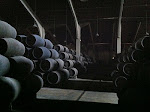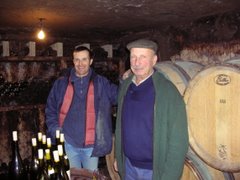Guesswork in the Cellar
Recently I had the rather disturbing realization that almost half of the bottles in my cellar are wrong. They are not wines that today I would bet on to give me the pleasure that I look for in mature wine. There's nothing terrible in there, but there are plenty of wines in which today I would not make the investment of money, cellar space, or time. It got me thinking again about this whole question of aging wine. How should I decide on the wines I want to age?
Let me be clear - I am not asking about which mature wines I want to drink. That's easy, I would say. I want to taste any and all mature wines so I can learn more about what to expect from various young wines as they age. I'm asking about about selecting young wines for the cellar.
Keith Levenberg wrote something interesting about this a little while ago, telling a story about buying 6 bottles of 2001 Bernard Levet Côte-Rôtie La Chavaroche, drinking one and not being moved, and then "disposing" of the rest by bringing them to dinners with people who don't care which wine they are drinking. And then he drank a bottle of the same wine but from the 1983 vintage, and was moved. Enough to bring newer vintages of La Chavaroche back into his cellar.
I have never tasted a young version of a classically made and age-worthy wine, and then aged that wine to maturity. I simply have not been collecting wine long enough to do that. I have never tested my own ideas about which wines in time will become what I'm hoping for, and which will not. I don't know if I'm right when I drink a young wine and then think "yes, this wine should age well."
Think about it - you have to have been collecting wine for 25 years if you've tasted a great old bottle of Burgundy, Bordeaux, Barolo, or northern Rhône wine that you bought upon release. It's rare to be in the company of such a person. I only rediscovered wine about 7 years ago. Who knows if I will still care about wine in 25 years? Will I drink my 2007 Bernard Baudry Les Grezeaux with the same delight that I felt in putting it into storage, planning for that day? I'm just guessing every time I put something in my cellar. I'm more educated now with my guesses, but I am still guessing.
I actually feel pretty good about what I put into the cellar these days. Some of this is simply understanding what it is that I like in wine. For example, I cellared almost nothing from the 2009 vintage in Burgundy. 2009 was a ripe vintage that gave big wines and that is not the thing that excites me about Burgundy. I saved a few nice bottles from 2007 and 2008, though. Wines from those vintages tend to have less ripeness and body, but while very young they showed a balance, clarity, and detail that I found compelling. Will that translate to mature wines that are exquisitely balanced, thrillingly detailed, and terroir-expressive? Honestly, I have no idea. I do like the idea, though, of cellaring wines that today show some of the characteristics that I want to be amplified in maturity.
Another thing that I'm enjoying lately is thinking of all of the recent vintages I've had of wines that I actually have built some familiarity with, and trying to decide which recent vintage is the one I would cellar if I had to choose only one vintage. This is not always easy to do.
For example, I've drunk several bottles of Foillard Morgon Côte de Py each vintage since 2006. I was in love with the 2007 and felt that it would age well so I saved a few bottles in the cellar. But then one night a couple years ago I was hanging out with Joe Salamone, one of the wine buyers at Crush, a lovely guy whose thoughts on wine are always smart and well-considered. I asked him what he thought about the 2007 vintage of Foillard Côte de Py, hoping he would confirm my belief. He said that he liked the wine a lot, especially for short term drinking, but that he didn't think the 2007 was a good candidate for long term aging. Hmmm. So maybe my read is wrong on age-worthy Foillard Côte de Py. I've since drunk all of my remaining bottles except for one, and it's true - it is already showing mature notes and it feels completely harmonious. Still, I think I need to see what will happen with another 5 years or so. You know, to confirm or refute my own hypothesis. The 2010 Foillard Morgon Côte de Py, by the way, is the recent vintage that I would now bet on for best future satisfaction.
It will be fun to see what happens with these wines down the road, as I have a bottle or two of each vintage in most cases. I hope I still care about this by the time they mature, and who knows, maybe the 2008 Gonon will turn out to be best in 15 years.








8 comments:
provocative as always, BG.
Ironically, one of the shortcomings of (1) being in perhaps the greatest wine city in the world where so much is available easily; (2) having your [BG's] curiosity and intelligence; and (3) having so many friends to share their wines and enthusiasms with...is that there are infinite possibilities and opportunities to satisfy every whim.
Even not having any of those 3 advantages above, I find myself wanting just about every wine at (say) Chambers, but realize that a couple of everything may ultimately add up to not very much.
Just to use the tired, traditional example of Bordeaux. I know people who simply buy a case or more of Leoville Barton every vintage. A good wine, certainly, but it seems to the more hyperactive of us to be a boring enterprise. And yet, what a great way to experience variations in vintage and aging.
In the end, what does it matter really what Northern Rhone you buy (assuming it's not an extreme Parkerized style) if you can own long verticals with plenty of depth? Wouldn't that be a fantastic experience? Maybe less really is more.
And, somewhat in the spirit of the Keith Levenberg experience, maybe those wines you've cellared that today bring no joy will be your favorites when they mature. No reason to believe that in the future what you believed before is a worse idea than what you believe now.
sorry--I guess I wasn't done (same anonymous).
One of the great psychological crises of our time is the phenomenon of nearly infinite choice.
Because of various social forces (starting with Michael Broadbent reopening Christie's wine auctioning after WW II, to the Parker/professional critic phenomenon, to today's internet auctioning and the amazing CellarTracker), it's easy to constantly revisit every purchasing decision and dispose of "mistakes." Effectively every bottle is being reassessed real time. So, someone you really respect on CellarTracker didn't think the wine great THIS time? Nuts, I shouldn't have gone so long myself. Maybe I'll drink one early and if I agree (and of course that's the anxiety of influence rearing its ugly head) I'll sell mine.
Don't do that. Forget about getting it right. Wine is fun, and wine is biography. The perfect is the enemy of the good, said some wine-loving Greek philosopher.
I'm no expert, but I wouldn't write off 2009 in Burgundy. Some interesting reading here: http://wineberserkers.com/forum/viewtopic.php?f=1&t=47336 if you can ignore the egotistical static and glean some of the good points being made.
Cheers,
David M
What a timely post. I've been thinking a lot about this recently, and in fact some of it has to do with the very wines you mention in this post.
I do like the approach Anon suggests -- a cellar full of verticals of your favorite producers is probably more interesting in the end then a bottle or two of everything -- a great way to learn about vintage and vineyard variation. It's an approach I've tried to let guide me in recent years.
There is also the question of whether you buy fewer of something at a higher price point. I've recently wondered whether I should sock away the Gonon you mention, or spring for just a couple Allemand, for example (that is well into the splurge category for me). Likewise re Foillard. I have a nice vertical of his wines put away, but I've never tasted a mature one. I'm largely going on faith and curiosity. Would my money be better spent on fewer bottles of top flight Burgundy? Wine that I know has the reputation of impressive results with a decade or more in the cellar?
I often look at what is in my humble cellar and come to the same conclusion you have articulated: lots of great wine here, but anything I believe will be truly eye opening in 15-20 years? I'm not sure.
Being a time of reflection for Jews, I thought more about my two posts above. My main points about the current anxiety of cellaring wine were: the growth of the authoritative wine critic morphing into the 24/7 wine criticisms on CellarTracker; and the reintroduction of the great auction houses (selling wines from tax-impoverished British lords) after WW II morphing into on-line buying/selling for us all.
My third point ia the transition from the massive passive cellars (under British estates and London townhouses) to the modern refrigerated units and off-site storage. Now, besides the actual investment in the bottles, it also costs money to store those bottles. And there are significant physical limitations for most wine collectors.
Anyone lacking a large passive cellar faces continuous opportunity costs. A bottle cellared is another bottle that cannot be cellared. Every CellarTracker tasting note challenges one's previous decision, and on-line auctioning makes it easy to undue one's now challenged decision.
In the old days, you bought a boat-load of wine (almost literally), and lived with it (passing the first growths and grand crus to your heirs, along with the rest of the estate). Its purpose was to accompany and compliment food. It wasn't obsessed about, reviewed, and fussed over. The meal wasn't built around.
Can the outcome of crushed grapes infected by surrounding yeast bear all the weight that the modern world now puts on it?
BG - thanks for the post - this struck a nerve with me as well. Being forced to lay out a bunch of money AND wait for years for an uncertain payoff is frustrating. I'm still figuring out what I want to cellar and feel like I'm going to make mistakes. I like the mini-vertical idea and may start to do this with some favorite producers.
Marc - I also share your dilemma of a 'humble' cellar and wondering whether I should pay more for fewer bottles. I've decided that I'd rather have a higher quantity of humble wines - better to get a case of Lapierre 10 rather than three bottles of $80 red burgundy. The thing I'm fascinated by is seeing the evolution and having some idea how wines change over time. I wish I could afford to do this with some more expensive wines (which are usually thought of as more "ageworthy"), but it's hard to be too upset when I think about the quality that can be had at $30 and under.
To add to your comment, Unknown, I'd go so far as to say there's going to be something particularly satisfying about pulling out a bottle in 10 years that was sub-$30 on release. It's easy to get carried away and start thinking I should be splurging on Burgundy, but that Pepiere Muscadet that was freaking $16 when I bought it will provide me a whole lot of satisfaction, I suspect. And, as you say, being able to see the evolution given that I drank a bunch upon release is important to me -- I wouldn't be able to do that if I bought a single bottle of $100 Burg. Maybe I'm contradicting my previous comment - but maybe that's the point. There aren't any easy answers here. And as a previous commenter said, that's the whole fun of it.
I'll first agree with David, that you shouldn't write off the warm vintages. While you may find them to be too much young, it is often the warm vintages that age best because they age on all of that material. Is it true that burgundy ages on its acid? I don't know, I think it can be the case but don't discount the importance of tannin and fruit in the long term.
As for the low cost down the line argument, I think that it is best to remember (1) due to inflation they'll all seem cheap down the line, and (2) while old collectors may revel in the deals of their youth (while lamenting the by-gone prices no doubt) the complaint you'll hear more often is that they shouldn't have bought so broadly, or for value, and should have bought fewer bottles but of greater quality. Now, the hard part is applying that logic. I myself have moved the other way, more bottles of lesser cost in the hopes that they age. In part this is my own economic reality, in part the reality of our times with fine wine regions becoming increasingly off limits for most drinkers, and in part it is a psychological refusal to shell out the greater cost even if the older me will thank the younger in time.
Post a Comment